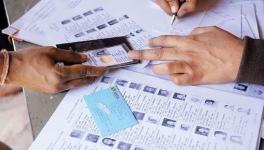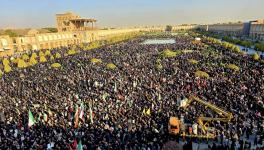BJP’s Hindutva Agenda Fails to Strike Chord With Bangladeshi Migrant Voters in Pilibhit
Pilibhit (Uttar Pradesh): The Bharatiya Janata Party’s (BJP) high-decibel Hindutva propaganda doesn’t resonate with Parul Mondol and her brother Golak Sana anymore ahead of the Uttar Pradesh (UP) elections. They are among the thousands of Bangla-speaking Hindu refugees staying in Pilibhit for nearly five decades who are frustrated with the saffron party.
The Terai district, close to the India-Nepal border, is home to more than 1.25 lakh Bengali migrants with nearly half of them born in India. Despite having Aadhaar, PAN and e-Shram cards, bank accounts, caste certificates and even Indian passports, most of them can neither vote and avail government welfare schemes nor apply for state and Central jobs.
With their origins in erstwhile East Pakistan, the Hindu migrants—who moved to India between 1958 and 1974 after being hounded in the decades post-Partition and again during the creation of Bangladesh—have been meted out differential treatment vis-à-vis the refugees from (West) Pakistan who were adequately rehabilitated, precisely settled, by then-Prime Minister Jawaharlal Nehru.
Only those refugees who crossed the border from designated immigration camps were considered legal migrants and subsequently rehabilitated. Years after their arrival, they were awarded citizenship and allotted five acres. But not all such refugees were granted citizenship and rehabilitated properly.
The rest of the migrants who arrived from different places in East Pakistan, but not through immigration camps, were considered illegal immigrants. Therefore, they were neither granted citizenship nor rehabilitated.
Every refugee family was allotted five acres but strangely not awarded with valid revenue titles for their lands. They have now encroached upon the land of the Irrigation and Water Resources Department after the land allotted to them in Gunhan, Bijauri Khurd Kalan and Ramnagra villages in Puranpur block were eroded by Sharda river in 1989.
The lack of citizenship has also impacted the children of these refugee families. Despite being categorised as Schedule Caste (SC), their children are never facilitated with government-sponsored SC scholarship.
Without allotment of another piece of land and regularisation of the lease of their agricultural land, the faith of the once-hard-core BJP has been shaken.
Mondol is among the migrants who have the right to vote. She is an Indian citizen because her father Anath Sana, who had arrived from the Ranaghat immigration camp, was granted citizenship in December 1992.
“We trusted Modi and Yogi and voted for them only to be abandoned,” Mondol, who voted in the last Lok Sabha and UP elections, told Newsclick. “After our land in Gunhan was eroded by Sharda river, we were not allotted another land. We have encroached upon government land, where we cannot construct permanent houses due to the risk of eviction.”
Commenting on the BJP’s plan to construct a “magnificent temple in Ayodhya” and their future, Mondol said, “It’s fine that the deity of Ram found back its place. But what about us and our children? We are forced to live in inhuman conditions.”
While Mondol and other female members of her family earn their livelihood by making bidis, the menfolk work as farm labourers. “Due to the skyrocketing prices, it is difficult to bear the unavoidable expenses of the family with our limited income. Even sustenance has become a challenge. The BJP has made our lives a living hell,” an angry Mondol said.
Mondol’s brother Golak Sana, 38, too regrets his decision to vote for the BJP in the last two elections. He became extremely upset after failing to get the fertilisers required to sow his Rabi crop in his two acres.
Showing his saffron scarf wrapped around his neck, Sana said, “Inspired by the BJP’s idea of Hindutva, I put on the scarf with great devotion. But I am deeply disappointed. Safeguarding of religion is fine, but will it solve the problem of earning our bread and butter and the lack of a safe place to stay?”
Dhirendra Biswas cannot vote. His father and uncles had first migrated to West Bengal, then Madhya Pradesh and finally to Pilibhit from Khulna, in East Pakistan, in 1964. They settled at Gunhan village and were allotted five acres each on a 90-year lease. The devastating Sharda river flood in 1989 ate away their land, displacing them to Sharda Sagar Dam area.
“We have all government documents, like Aadhaar, PAN and e-Shram cards, bank accounts, caste certificates and even Indian passports—still, we are not bona fide Indian citizens. We cannot vote in Assembly and parliamentary elections because our names are not registered on the electoral rolls,” 40-year-old Biswas told Newsclick.
The daily wager described the futile process of applying for a voter ID card. “We have to submit our caste certificates, which mention that we migrated from East Pakistan. Consequently, we are asked to submit our citizenship documents. Since we don’t have this document, we are denied a voter ID card every time we apply.”
Biswas alleged that his community is subjected to discrimination in the state. “We cannot avail the benefits of government welfare schemes for schedule castes,” he said adding that the community members are either self-employed or farm labourers.
Santosh Biswas, 70, has the same story. Despite being born in India and staying in UP for the past 42 years, but he is not a citizen. “My father Dhiren Biswas had migrated to Malda, West Bengal, from Faridpur, in East Pakistan. Forty-two years ago, we arrived in Ramnagra. We even filled ‘unofficial forms’ that asked us to mention whether we were persecuted in our countries of origin, date of arrival in India and the details of identity papers,” he said.
The ‘unofficial form’, which is neither issued by any government department nor bears the signature of any official and stamp of authorities, is distributed only to carry out a survey of the immigrants. The date of arrival is important because the cut-off date to apply for citizenship is December 31, 2014.
Citizenship depends on the citizenship of one’s parents, not so much on the place of birth. A person is considered an Indian citizen by birth only if he or she was born after December 3, 2004, at least, one of his/her parents is an Indian citizen and neither of the parents is an illegal immigrant.
Saraswati Roy, 70, said that the first batch of Bengali refugees from East Pakistan arrived between 1958-1961. Roy, who crossed the border with 175 families in 1964, said that only those migrants who moved to India in 1971 through “immigration camps” were allotted five acres in Pilibhit and granted Indian citizenship.
“Life will be better for us if we get citizenship,” said the mother of two married daughters and one earning son. “It hurts when we are called Bengalis and discriminated against despite living here for decades,” a visibly sad Roy said.
Seventy-seven-year-old Satish Biswas has a voter ID card along with other government documents but is not considered an Indian citizen. “I arrived from East Pakistan in 1964. I have all the documents, including the voter identity card, to establish my citizenship—yet, I am not an Indian citizen. We don’t have access to even basic facilities, like a hospital, clean drinking water and educational institutions. After our agricultural land was washed away in the 1989 floods, we have been living on this government land in the dam area without any compensation,” he said.
“The government brought the Citizenship Amendment Act, seeking to grant citizenship to persecuted minorities in Pakistan, Bangladesh and Afghanistan. But we are still denied citizenship,” Biswas added. “Many of us are still working under Hindu landowners as bonded labourers. And, the BJP talks about Hindu unity. Isn’t it laughable?”
Amarjit Mondol, 22, who passed the 10+2 exams in the science stream last year, said that he could avail the government scholarship meant for SC students despite being a member of the marginalised community. “I was denied a scholarship because I could not produce the mandatory citizenship document,” he alleged adding that he is also not a voter. “I tried to get registered as a voter four times. My applications were rejected despite enclosing my father’s voter ID card and land documents. We are being tortured in the name of citizenship,” he said.
Twenty-four-year-old schoolteacher Jeevan Haldar is among the handful of literate youths in Mala Colony village of the district. His grandfather Nirodh Mandal had arrived in Pilibhit from the Ranaghat camp in Bangladesh along with the first batch of refugees.
Despite being an official refugee, Haldar faces another problem. “My grandfather was allotted some land for 90 years. The lease expired in 1990. As my grandfather is no more, his legal heir certificate could not be issued as he was not an Indian resident. So, we were unable to renew the land allotment,” he said.
Though the Pilibhit district magistrate could not be reached for comments, officials in his office claimed on condition of anonymity that a list of around 40,000 refugees identified in the district has been forwarded to the Centre for grant of citizenship under the amended citizenship legislation.
“The initial exercise to assess the numbers of refugees has been completed, and we have already sent a report to the Centre for granting them citizenship,” an official told Newsclick. Regarding the regularisation of land allotted to the refugees, he said that the government, not the district administration, has to take the decision.
Get the latest reports & analysis with people's perspective on Protests, movements & deep analytical videos, discussions of the current affairs in your Telegram app. Subscribe to NewsClick's Telegram channel & get Real-Time updates on stories, as they get published on our website.
























